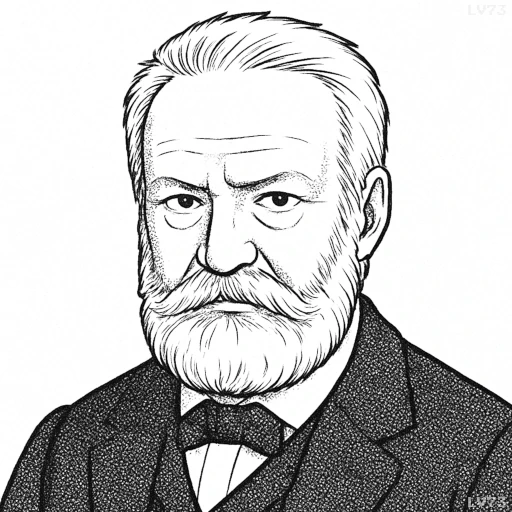“Hell is an outrage on humanity. When you tell me that your deity made you in his image, I reply that he must have been very ugly.”

- February 26, 1802 – May 22, 1885
- Born in France
- Author, poet, playwright
table of contents
Quote
“Hell is an outrage on humanity. When you tell me that your deity made you in his image, I reply that he must have been very ugly.”
Explanation
In this provocative quote, Victor Hugo expresses his strong objection to the concept of hell and its implications for humanity. He argues that the idea of a place of eternal punishment or suffering—often associated with religious doctrines—represents an injustice and an outrage to human dignity. For Hugo, the idea of hell contradicts the values of mercy, compassion, and justice that should guide human life.
The second part of the quote addresses the religious idea that humanity was made in the image of God. Hugo challenges this notion by sarcastically suggesting that if humans truly reflect the divine, then the deity must not be very appealing or benevolent. He uses irony and bluntness to critique the idea of a deity who would create beings capable of suffering in such extreme ways, casting doubt on the benevolence or perfection of such a creator. The ugliness Hugo mentions symbolizes not just physical appearance but a deeper moral ugliness—the inherent contradiction in a system that allows for suffering and eternal punishment.
Hugo’s words reflect his humanist beliefs and his commitment to reason and justice over religious dogma. He advocates for a more compassionate and humane view of existence, one that emphasizes mercy and understanding over punishment and fear. The quote also criticizes the concept of a divine being who would allow such suffering to exist in the world, challenging traditional religious views that justify eternal damnation.
In modern terms, this quote speaks to the moral and philosophical critiques of traditional religious doctrines, particularly the concepts of hell and punishment. Hugo’s words challenge us to reconsider how we define divinity, justice, and human dignity in the context of modern understanding, urging us to focus on compassion, reason, and human rights rather than fear and retribution.
Would you like to share your impressions or related stories about this quote in the comments section?



